Bosch receives massive €13 billion worth of electromobility orders
When it comes to electromobility, Bosch says it is “driving in the fast lane”.
Electromobility is a general term referring to electric-powered drivetrains designed to shift vehicle design away from the use of fossil fuels and carbon gas emissions.
Bosch claims that “no other company has as much expertise” in this domain. The giant company has long been one of the world’s leading suppliers of existing automotive technologies.
Bosch’s relatively newly acquired expertise in electromobility is already paying off: since the beginning of 2018, Bosch says it has won electromobility orders worth approximately €13 billion, including production projects for electrical powertrains for passenger cars and light trucks.
Thanks to these successful orders and its innovative strength, Bosch says it is “holding its own” in what it admits is a “currently difficult environment”.
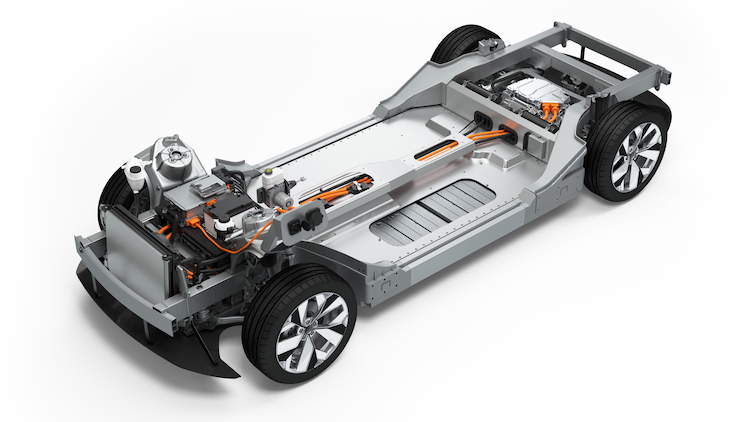
The mobility solutions business sector is again developing better than global automotive production in 2019.
Despite the market’s current significant downward trend, the sector’s sales from operations will come in at just under the previous year’s level.
Dr Volkmar Denner, chairman of Bosch, says: “The transformation of mobility entails challenges, but also opportunities. We want to grasp them.
“Technologically, Bosch is approaching the mobility of the future with an open mind. It is both further refining conventional powertrains and fast-tracking electrification.
“In addition, the company is working to make mobility automated, connected, and personalized. One key to this lies in electronics and software.
“The company’s mobility operations currently employ some 14,000 software engineers, and annual expenditure on software expertise comes to €3 billion.
“The objective is to keep people mobile in an eco-friendly way and to ensure that mobility is accessible to everyone. “Bosch is making mobility climate-friendly and affordable.”
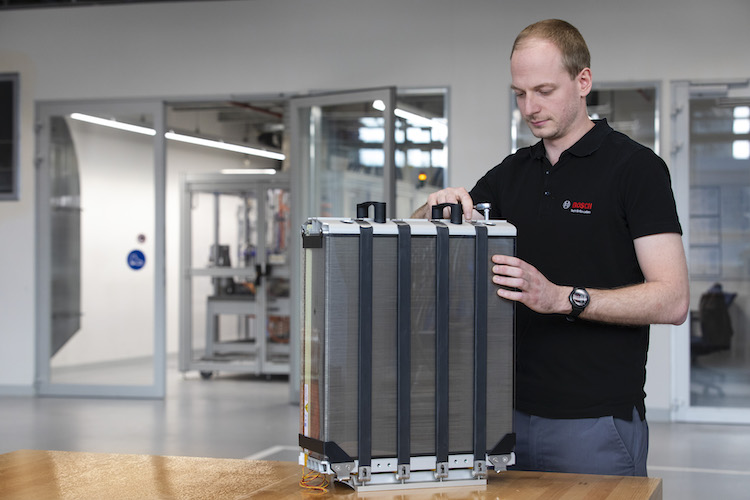
Efficient powertrains: from combustion engines to fuel cells
Bosch is leading the way in climate action, and this not only by making all its locations worldwide carbon neutral from next year.
Denner says: “We are also devoting ourselves to developing mobility solutions that have no appreciable impact on global warming and air quality.”
Each year, the company invests some €400 million in emissions-free mobility. When it comes to electromobility, Bosch claims it has a broader footprint than other companies – from bikes to trucks, and from mild 48-volt hybridization to the fully electrical powertrain.
Bosch is aiming to achieve a leading position in the market with its 48-volt battery, and has concluded a long-term cooperation agreement with the Chinese company Contemporary Amperex Technology for the production of battery cells.
At the start of the year, Bosch forecast sales of €5 billion by 2025 with electromobility components and systems for passenger cars and light trucks. Now it expects to exceed that figure.
Denner says: “Whatever the technology that brings about emissions-free mobility, we have to get the market to accept it. We will only manage that with affordable solutions. If we don’t offer them, we won’t help stop global warming.”
On its path to becoming the market leader in electromobility, Bosch also wants to create a mass market for fuel cells and is taking them into production.
Here, economies of scale will also help make the manufacture of this still expensive technology more cost-effective.
Denner says: “Bosch is making alternative powertrains affordable.”
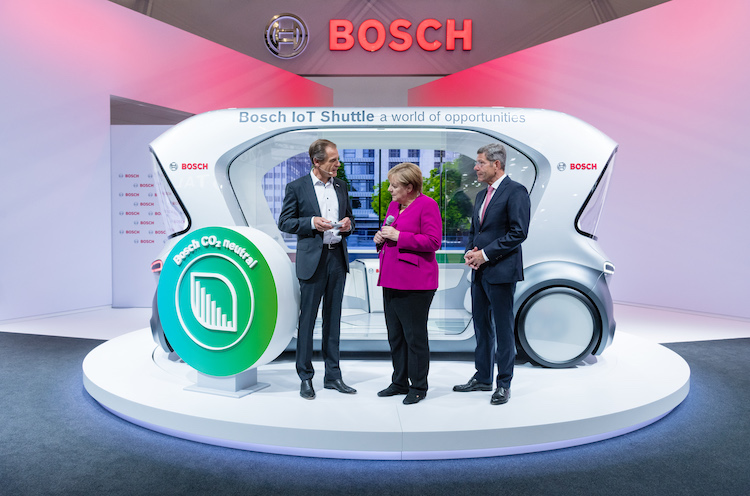
New technology: less particulate matter, less brake dust
In 2030, however, three-quarters of new vehicles will still have a conventional engine under the hood, some of them with electrical support from a 48-volt system or a plug-in hybrid.
For this reason, Bosch is making not only the much-maligned diesel engine but also the gasoline engine more efficient.
Its most recent advance uses modifications to the engine and modern exhaust-gas treatment to bring particulate emissions from gasoline engines down to a level as much as 70 percent below the Euro 6d standard, even in real driving conditions.
Bosch also wants to minimize particulate emissions from braking. Developments here include the iDisc, which generates as little as 10 percent of the brake dust produced by a conventional brake disc, and the regenerative braking system, which can cut brake dust by over 95 percent in electric vehicles.
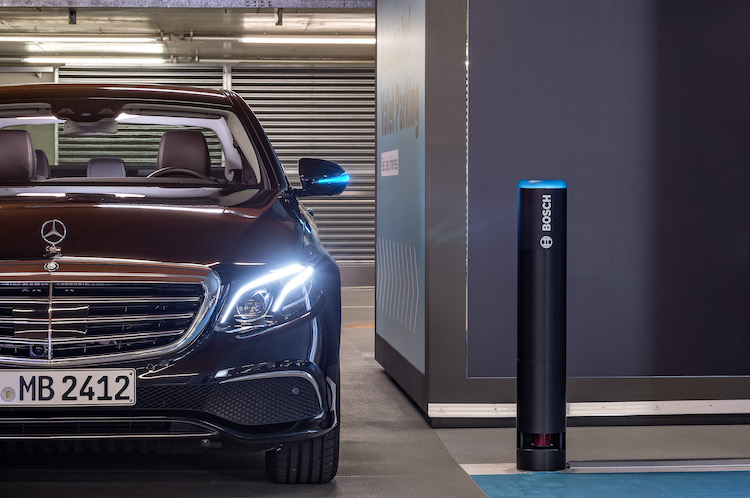
Milestone: first level 4 system approved
Bosch is also posting substantial business success in automated driving. Driver assistance systems form the basis for this. In this area, Bosch will generate 12 percent growth this year, and sales of €2 billion.
For the next levels of automated driving, Bosch will invest €4 billion up to 2022.
For the US and Asian markets, Bosch is currently developing level 2 systems that allow drivers to take their hands off the wheel on the freeway.
In Germany, Bosch and Daimler were recently granted the world’s first approval for a level 4 system – automated valet parking in the parking garage of the Mercedes-Benz Museum in Stuttgart (pictured above).
This automated valet parking service has thus progressed beyond the prototype stage. By the end of 2021, it is expected that a dozen other parking garages will be equipped with automated valet parking.
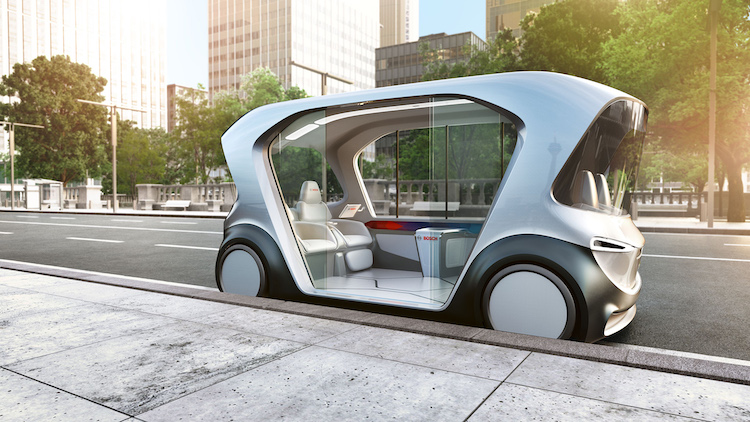
Customized mobility: shuttle services and rolling chassis
The transition in the mobility industry is giving rise to new market players. Bosch is also entering into business with these players.
For example, the company is working with DiDi, Lyft, and Uber – the three biggest ride-hailing providers, who already arrange more than 50 million rides a day worldwide.
DiDi, which is the leading Chinese provider of mobility services, is using Bosch’s cloud-based battery services to help increase the service life of their vehicle batteries.
In the future, mobility service providers such as these will increasingly use shuttles to offer customized on-demand mobility.
By 2025, it is expected that more than 2.5 million shuttles will be driving on the world’s roads.
With its solutions for electrification, automation, connectivity, and personalization, Bosch wants to help these providers offer ride-hailing services featuring maximum comfort and security.
The undercarriage of such shuttles could be a rolling chassis – a ready-to-drive, modular platform that serves as a flexible basis for various bodywork designs.
In this area, Bosch entered into an alliance with the chassis and automotive specialist Benteler at the start of the year.
Automobil Pininfarina will be the first customer to use the rolling chassis for its own vehicles, and will also act as a reseller for the chassis.

